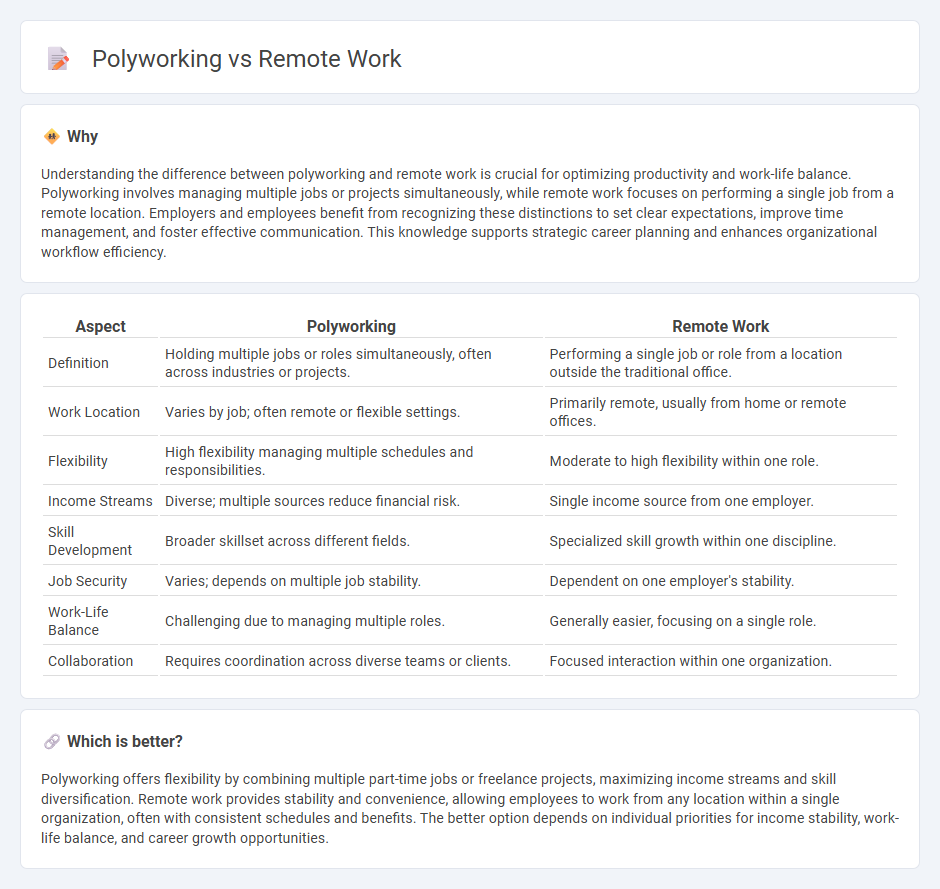
Polyworking involves juggling multiple jobs or roles simultaneously, offering diverse income streams and skill development, while remote work focuses on performing one primary job from a location outside the traditional office. Both employment styles leverage digital communication tools but cater to different flexibility and career goals. Explore how polyworking and remote work reshape modern employment dynamics and personal work-life balance.
Why it is important
Understanding the difference between polyworking and remote work is crucial for optimizing productivity and work-life balance. Polyworking involves managing multiple jobs or projects simultaneously, while remote work focuses on performing a single job from a remote location. Employers and employees benefit from recognizing these distinctions to set clear expectations, improve time management, and foster effective communication. This knowledge supports strategic career planning and enhances organizational workflow efficiency.
Comparison Table
| Aspect | Polyworking | Remote Work |
|---|---|---|
| Definition | Holding multiple jobs or roles simultaneously, often across industries or projects. | Performing a single job or role from a location outside the traditional office. |
| Work Location | Varies by job; often remote or flexible settings. | Primarily remote, usually from home or remote offices. |
| Flexibility | High flexibility managing multiple schedules and responsibilities. | Moderate to high flexibility within one role. |
| Income Streams | Diverse; multiple sources reduce financial risk. | Single income source from one employer. |
| Skill Development | Broader skillset across different fields. | Specialized skill growth within one discipline. |
| Job Security | Varies; depends on multiple job stability. | Dependent on one employer's stability. |
| Work-Life Balance | Challenging due to managing multiple roles. | Generally easier, focusing on a single role. |
| Collaboration | Requires coordination across diverse teams or clients. | Focused interaction within one organization. |
Which is better?
Polyworking offers flexibility by combining multiple part-time jobs or freelance projects, maximizing income streams and skill diversification. Remote work provides stability and convenience, allowing employees to work from any location within a single organization, often with consistent schedules and benefits. The better option depends on individual priorities for income stability, work-life balance, and career growth opportunities.
Connection
Polyworking and remote work are interconnected through their shared emphasis on flexibility and autonomy, allowing individuals to manage multiple jobs or projects from various locations. Remote work facilitates polyworking by removing geographical constraints and enabling seamless communication across different employers or clients. This synergy enhances productivity, work-life balance, and access to diverse income streams in the digital economy.
Key Terms
Flexibility
Remote work offers employees the flexibility to perform their tasks from any location, promoting a better work-life balance and reducing commute time. Polyworking enhances this flexibility by allowing individuals to engage in multiple jobs or projects simultaneously, diversifying income sources and skill sets. Discover how embracing these flexible work models can transform your professional life.
Productivity
Remote work enhances productivity by reducing commute times and offering flexible hours, allowing employees to tailor their environment for optimal focus. Polyworking, the practice of juggling multiple jobs simultaneously, boosts productivity through diverse skill application and increased motivation but can risk burnout if poorly managed. Explore how each work style impacts output and well-being to choose the best fit for your professional goals.
Work-life balance
Remote work enables employees to perform tasks from any location, providing flexibility that enhances work-life balance by reducing commute times and allowing personalized schedules. Polyworking involves juggling multiple jobs or projects simultaneously, often blending different roles that can enrich skills but may challenge time management and stress levels. Explore more about how these work styles impact productivity and personal well-being.
Source and External Links
What Is Remote Work? Ultimate Guide | Wrike - Remote work means employees can work from home or any location outside the company's office, facilitated today by tools like Slack and Zoom, and is reshaping work-life balance and productivity.
What is the definition of remote work? - OPM.gov - Remote work is a flexible work arrangement where employees perform their duties at an alternative worksite under a formal agreement, with no expectation to regularly work from the agency's physical location.
Remote Work From Home jobs in San Jose, Ca - Indeed - There are numerous remote job opportunities in various fields available from San Jose, CA, allowing flexible schedules and the ability to work independently from home.
 dowidth.com
dowidth.com